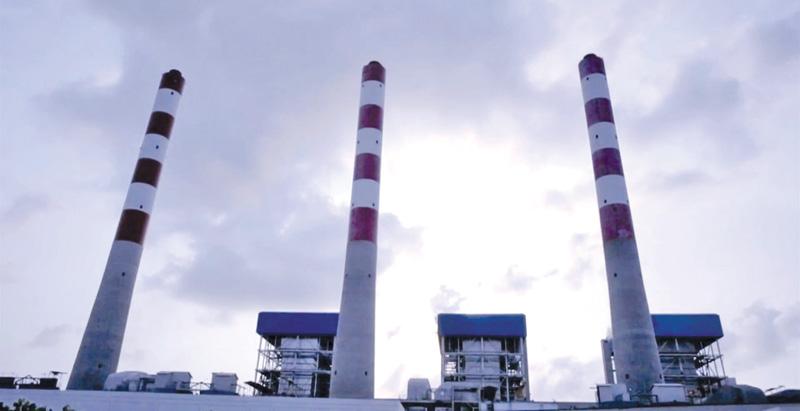
Peter and his family are not alone, 25 other families living within the vicinity of the Lakvijaya Power Plant or Norochchcolai are contemplating to leave their homes. “We don’t have a place to go and we’re afraid that if we go, we might not be able to come back.”
 He explained that the monsoonal winds which swept over much of Sri Lanka last week have brought on a severe gust of fly ash and charcoal than ever before. He describes his home and many others being obscured by fly ash. “Our children cannot dry their clothes, a few minutes is all it takes for their clothes to be tainted in ash,” he says, adding that they are unable to go about their day-to-day work.
He explained that the monsoonal winds which swept over much of Sri Lanka last week have brought on a severe gust of fly ash and charcoal than ever before. He describes his home and many others being obscured by fly ash. “Our children cannot dry their clothes, a few minutes is all it takes for their clothes to be tainted in ash,” he says, adding that they are unable to go about their day-to-day work.
Peter also has a bigger problem to deal with. Although he is a fisherman, neither can he nor anyone in the neighbourhood go fishing. “Hot water is being pumped back into the sea and it’s killing all the fish. This has been happening for quite a while but no one seems to care.” He asserts the fishery harvest has been reduced to nearly 20% of what it used to be.
Along with hot water which flows back into the sea, fishermen also complain of coal spillage. Barges are used to get the coal inland and chunks of it fall when unloading them from the ship to the barge and then closer to the jetty. It is estimated that nearly 60,000 metric tonnes of coal is transported to the port, annually.
There are however, no studies or findings to indicate just how much of it is spilt. Peter’s plight resonates with that of many residents in the vicinity. The others the Sunday Observer spoke to, seemed to echo the same sentiments adding that their pleas have fallen on deaf ears. At one point they were promised a chemical would be sprayed on the mounds of charcoal, so that it would remain intact, but that too is yet to happen.
The residents also claim to suffer from respiratory illness periodically, and attribute much of it to the fly ash residue that they continue to breathe in. Peter and many others like him describe their surroundings as a thriving and lush agricultural plantation, a time when they were self-sufficient. Today, nothing grows, neither can anything be grown in the area.
M.C Alexander, a petitioner in the case which Environment Foundation Limited (EFL) has filed against the power plant, says, various promises were made from time to time and meetings called, but no decisions have been reached so far.
“The Ceylon Electricity Board (CEB) promised to build a wall of trees to block the ash from being scattered to the village, and there was another plan to sell the ash to the cement industry,” said Alexander, a Pradeshiya Sabha Councillor. “But nothing has happened so far.”
Alexander claims that at least three divisional secretariats are among the affected which includes nearly 500 families. He is one of the many members to take part in the meetings held in Colombo over the same matter, almost on a monthly basis. “We just finished a meeting last week and were told that we may have to attend another sometime next week. We keep attending, with the hope that it may bear fruit but the meetings have not brought any conclusive decisions.”
Alexander attends consultative meetings with a committee appointed to look into the environmental and soci-economic impacts of the plants on residents. The Supreme Court has mandated a regulator for the power sector, the Public Utilities Commission of Sri Lanka (PUCSL) was tasked to take necessary steps to regularize the environmental damage by the plant. The direction was given with regard to the ongoing Fundamental Rights Application which is pending in the Supreme Court.
Accordingly, a committee of expertise was appointed by the PUCSL in March 2016 to study the environmental impact caused by the thermal power plants in Sri Lanka. The fisheries and farmer community, the representatives of the Ceylon Electricity Board, Central Environmental Authority, North Western Provincial Environmental Authority, Department of Coast Conservation and Environmental Foundation (Guarantee) Limited discussed in depth the issues that the communities raised in this regard.
The first meeting was held on Wednesday, April 5 and the representatives of various communities discussed in depth all issues the villagers voiced and in the second meeting held on Monday, April 24, the villagers submitted their issues and concerns in writing to the Committee. The third meeting was held on May 22 and the findings from this would be forwarded to the courts by the PUCSL.
Alexander’s only hope is that this committee would be able to bring about some lasting solution to the problem that has ravaged the area for over five years.

